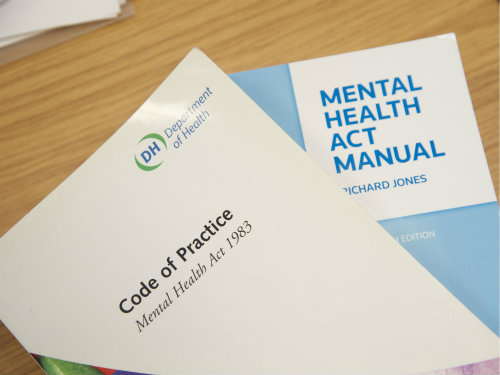
By Mark Ellerby
When you’re sectioned under the Mental Health Act you are deprived of your basic liberties and human rights so any appeal against your detention is taken very seriously. When you appeal you get your own lawyer.
From my experience when you’re trying to get your section overturned, the onus is on you – the patient – to try and prove you are capable of judging your own wellbeing. The burden of proof does not lie with the psychiatrist.
When I appealed against my section the first thing that struck me was the number of people involved in the tribunal process. Having been ill, I didn’t like the feeling of being under the spotlight. I definitely had stage fright. The panel for my appeal was composed of a chairman (a lawyer), an independent psychiatrist and a layperson with experience in mental health matters.
The whole thing felt like sitting my A levels. The interview I had was arduous. It lasted three yours. It was very detailed with lots of questions. I had to formulate everything I wanted to say at the end of the interview and then wait for the result. My lawyer helped with the former and was just as nervous as I was about the latter.
I must have looked pretty tired at the end of the three hours. Looking back, I think that went against me. It was however, very unusual (it was pointed out to me later) for the assessment to take that long. I think I may have been treated a little unfairly in that respect.
During my appeal I wasn’t allowed to speak while the panel questioned the different professionals involved in my care. They went right back through my psychiatric history and the circumstances that had led to me being detained.
My social worker, psychiatrist, and my link worker nurse all had to submit detailed reports. These were then picked over with a fine toothcomb. Sitting there, listening, I had to try and remember all of the points that were made in this process in order to argue my case against each one. This is extremely difficult when you’re ill and another reason you definitely need a good lawyer (mine was excellent).
My main argument was that I would stay in hospital voluntarily but during my psychotic episodes, I would want to go home. This was buttressed by the fact that I had previously been in hospital for over a year, during which time I was mostly a voluntary patient. This was duly noted.
In my case the independent psychiatric actually supported my appeal. However, I was told that although I interacted or ‘presented’ myself (as they put it) normally, my symptoms could still deteriorate very quickly and I could become very ill, very swiftly. The nurse at the hearing acknowledged that I didn’t need to be detained on a day-to-day basis but said that a section was necessary for those periodic moments when I had an episode and became very unwell.
One thing I learned is that if you have a history of ‘non-compliance’ with medication then this will play against you in an appeal. This was supposed to be the case with me. My parents supported the view that I was getting ill only in the moments in which I forgot to take them. I was never really sure if simply missing the occasional dose could trigger this and, to be honest, I still question it sometimes.
In the end, I failed to have my section overturned. My main criticism of the process is how long it all took. On the whole, looking back, I think that the panel actually made the correct decision in my case but then that’s looking back. At the time, it felt like confinement.
Related articles:
- ‘The rapport with my social worker was a vital part of my mental health care’
- ‘Ward environments made a real difference when I was detained under the Mental Health Act’
This is an edited extract from Mark Ellerby’s book ‘The Stages of Schizophrenia’ published by Chipmunka publishing.


 Bournemouth, Christchurch and Poole
Bournemouth, Christchurch and Poole  Hampshire County Council
Hampshire County Council  Lincolnshire County Council
Lincolnshire County Council  Norfolk County Council
Norfolk County Council  Northamptonshire Children’s Trust
Northamptonshire Children’s Trust  South Gloucestershire Council
South Gloucestershire Council  Wiltshire Council
Wiltshire Council  Wokingham Borough Council
Wokingham Borough Council  Children and young people with SEND are ‘valued and prioritised’ in Wiltshire, find inspectors
Children and young people with SEND are ‘valued and prioritised’ in Wiltshire, find inspectors  How specialist refugee teams benefit young people and social workers
How specialist refugee teams benefit young people and social workers  Podcast: returning to social work after becoming a first-time parent
Podcast: returning to social work after becoming a first-time parent  Podcast: would you work for an inadequate-rated service?
Podcast: would you work for an inadequate-rated service?  Family help: one local authority’s experience of the model
Family help: one local authority’s experience of the model  Workforce Insights – showcasing a selection of the sector’s top recruiters
Workforce Insights – showcasing a selection of the sector’s top recruiters 

 Facebook
Facebook X
X LinkedIn
LinkedIn Instagram
Instagram
Comments are closed.